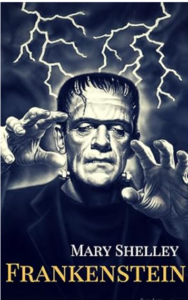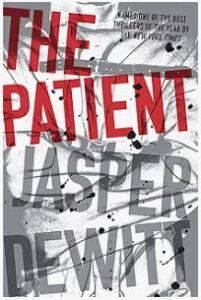Frankenstein; or, The Modern Prometheus, generally known as Frankenstein, is a novel written by the British author Mary Shelley. The title of the novel refers to a scientist, Victor Frankenstein, who learns how to create life and creates a being in the likeness of man, but larger than average and more powerful. In popular culture, people have tended to refer to the Creature as "Frankenstein", despite this being the name of the scientist. Frankenstein is a novel infused with some elements of the Gothic novel and the Romantic movement. It was also a warning against the "over-reaching" of modern man and the Industrial Revolution, alluded to in the novel's subtitle, The Modern Prometheus. The story has had an influence across literature and popular culture and spawned a complete genre of horror stories and films. It is arguably considered the first fully realized science fiction novel.

REVIEW AS A READER:
It was hard to separate the reader and the author in this read because I chose this book to do a gothic study. I saw a video by Tristan and the Classics from YouTube where he suggested reading the top 5 to 10 books in the gothic genre to get a sense of not only what the genre contains, but also how one book led to the other historically. I did just that and Frankenstein was one of the suggested books.
Like many people, I assumed the book was about a monster named Frankenstein. Not so. The scientist's name is Frankenstein and the monster is his creation.
Knowing that Mary Shelly was only 18 or 20 years old when she wrote this story was shocking to me because the book deals with a deep subject for the times in which she lived. Science had been delving into the issue of where does medicine stop and meddling in God's handiwork begin. There is always a certain amount of fear associated with new scientific discovery. In our day there are those who fear that AI will take over the world. This book was written in the face of some scientific fear that was prevalent in her day.
The book opens with a series of letters that anchor the reader into the time and place this story will unfold. Dr. Frankenstein is fascinated by all things scientific. His family sees that he has talent in this area and they insist he get extended education and experience, which he does.
At first Dr. Frankenstein is motivated by the ability to help people, to affect a positive change in the world. But slowly, this motivate gets twisted into a hunger for the fame and acclaim he will get for being able to rid humanity of illness. In this state of mind, he meats another scientist of his day, who shows him the ropes, so to speak, about doing scientific exploration. It sounded from the book that this type of cutting edge scientific exploration was done in the proverbial "garage labs" -- sort of like where Bill Gates and Steve Jobs started out.
I won't give away any of the details of what happens from this point forward because this is the story. Everyone knows, of course, that he creates this monster that is known world wide by the name of Frankenstein. But there is much more to the story than that.
As a reader, I had the usual struggle of reading "British" idioms and colloquialisms. I get the feeling that I'm missing something at times when I'm reading English writers. There was also the tiny struggle associated with reading a book that was written so long ago. The language changes and it's easy to miss things. I kept with it. With my Kindle highlighter, I kept track of all the characters and the plot points.
I would say this was a moral gothic tale about mankind overstepping our bounds scientifically. It was also a moral story about how the absence of virtue and living a life based on revenge can destroy people.
I enjoyed the book and did learn a lot about the gothic genre from it. Frankenstein by Mary Shelley was one of the first gothic books, one of the books that launched the gothic genre.
REVIEW BY AUTHOR:
Structurally, the book opened with a series of letters back and forth between I believe Dr. Frankenstein and his sister. I say "I believe" because I find myself not always "sure" of things when it's a British writer. I don't know if I'm alone in this, but in any event, the series of letters was a vehicle of dropping information about the backdrop of the story.
I have seen this method used many, many times in books today and always notice what the purpose of the letter-structure is. It added a bit of interest and intrigue into layout out the backdrop of the drama that was about to unfold.
The next part of the book reveals Dr. Frankenstein as quite a young man. He is filled with excitement and an unquenchable thirst for scientific knowledge. As stated earlier, he had all the best intentions in the beginning, but somewhere during his "forming" as a scientist, his ego took over and he stepped over the line. He develops the ability to give life to the lifeless and decides to create a man -- I mean, why not? Well, it doesn't go exactly as expected.
The main story is about how this experiment affected the creature as well as Dr. Frankenstein. The doctor's knowledge stopped at how to create a creature, but he didn't know how to care for and love a creature.
From a Christian perspective, his ego led him down the path of arrogance. He is overconfident and this blinds him to the fact that he has now crossed the line into "God's domain", the creation of life. As just stated, although he was able to give life to this creature, he wasn't able to care for him or provide a world where anyone could care for him. It shows the limitations of mankind and the disaster that occurs when arrogant men play God.
The story is about what happens to Dr. Frankenstein, his family and the creature. It is also a statement, although very subtle, of how the absence of virtue mixed with an obsession for vengeance can destroy a person's life, even their family's lives.
Again, as an author, I couldn't help but be so impressed with what young Mary Shelly was capable of not only understanding but her ability to craft a story around some very difficult issues.
It is a must read for anyone interested in the gothic genre. I would highly recommend it.
SOME MEMORABLE QUOTES:
- ". . . but it is the custom of the Irish to hate villains"
- "I pursued him, and for many months this has been my task. Guided by a slight clue, I followed the windings of the Rhone, but vainly . . ."
- "She was a hired nurse, the wife of one of the turnkeys, and her countenance expressed all those bad qualities which often characterize that class."

MY FAVORITE TURN OF PHRASES:
- She perished on the scaffold as a murderess.
- . . . sudden turn of a promontory, flourishing vineyards with green sloping banks and a meandering river and populous towns occupy the scene.
- The soil was barren scarcely affording pasture for a few miserable cows and oatmeal for its inhabitants, which consisted of five persons, whose gaunt and scaggy limbs gave tokens of their miserable fare.
- . . . hardly conscious of its extreme profundity until my ear was arrested by the paddling of oars near the shore . . .
- A few fishing vessels alone specked the water
- the gentle breeze wafted the sound of voices as the fisherman called to one another.
- . . . astonishment was exhibited in my countenance,
- . . . languishing in death, the dark orbs nearly covered by the lids and the long black lashes that fringed them;
- He wished me to seek amusement in society. I abhorred the face of man.
- The murderous mark of the fiend's grasp was on her neck . . .
- wandering ministers of vengeance
- I now related my history briefly but with firmness and precision, marking the dates with accuracy and never deviating into invective or exclamation.
- Everything was silent except the leaves of the trees, which were gently agitated by the wind; the night was nearly dark, and the scene would have been solemn and affecting even to an uninterested observer.
- He had heard my story with that half kind of belief that is given to a tale of spirits and supernatural events.




